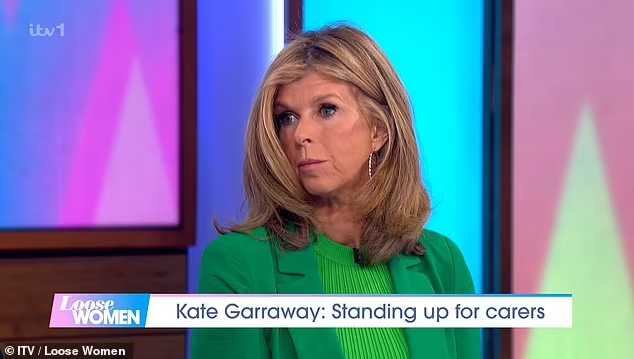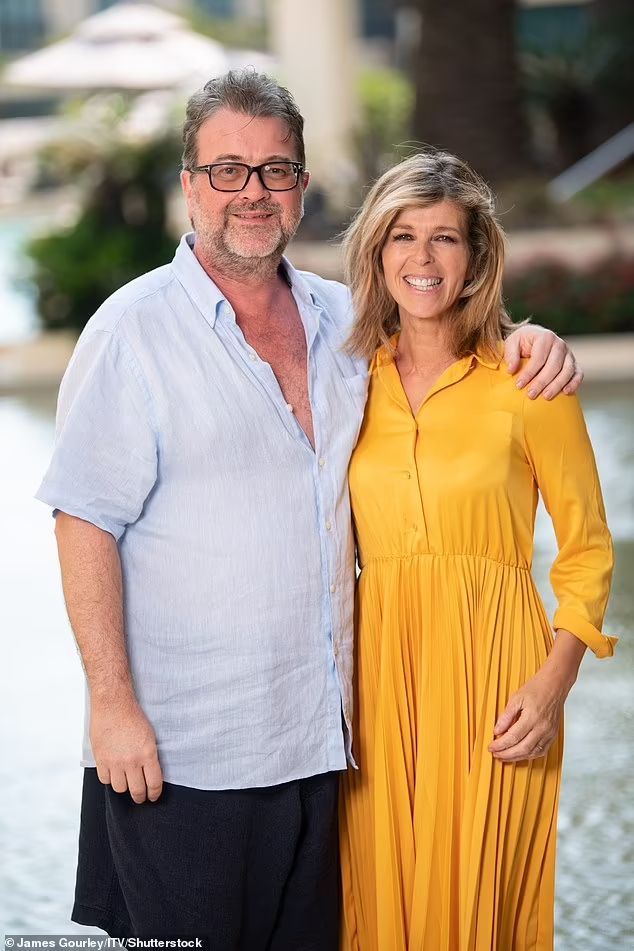Kate Garraway Opens Up: A Heartbreaking Conversation with Daughter Darcey

Kate Garraway, a renowned television presenter and journalist, has been a familiar face on our screens for many years. Known for her warmth and professionalism, Kate has always maintained a sense of privacy when it comes to her personal life. However, in a recent interview, she bravely opened up about a heartbreaking conversation she had with her daughter Darcey following the death of her husband, Derek Draper. This glimpse into Kate’s personal journey sheds light on the challenges faced by families dealing with grief and the importance of open communication during such difficult times.
Kate Garraway and Derek Draper’s love story is one that has captured the hearts of many. They were a couple deeply in love, with a strong bond that seemed unbreakable. However, their lives took an unexpected turn when Derek fell seriously ill with COVID-19. For months, Kate and her two children, Darcey and Billy, anxiously waited for news of Derek’s recovery. The uncertainty and fear they experienced during this time were unimaginable.
Sadly, Derek’s condition deteriorated, and he passed away on March 17, following a long and arduous battle with the virus. The loss of a loved one is always devastating, but the circumstances surrounding Derek’s death made it even more challenging for Kate and her family. In the midst of their grief, Kate found the strength to share her story, hoping it would bring comfort to others who are navigating similar journeys.


In a candid interview, Kate Garraway spoke about the heartbreaking conversation she had with her daughter Darcey after Derek’s passing. Darcey, who was just 15 at the time, struggled to comprehend the magnitude of the loss. Kate described how she had to find the right words to explain to her daughter that her beloved father was no longer with them. It was an incredibly difficult conversation, filled with tears and a profound sense of loss.
Kate emphasized the importance of being honest and open with children during times of grief. She acknowledged that finding the right words can be challenging, but it is crucial to create a safe space for children to express their emotions and ask questions. By sharing her own experience, Kate hopes to encourage other parents to have these difficult conversations with their children, knowing that it is an essential part of the healing process.
The importance of open communication during difficult times

When faced with a tragedy like the loss of a loved one, it can be tempting to shield children from the pain and sadness. However, Kate Garraway’s experience highlights the importance of open communication during difficult times. Children, even at a young age, have a remarkable ability to sense when something is wrong. By not acknowledging their emotions or avoiding conversations about grief, we risk isolating them and causing more confusion.
Open communication allows children to process their emotions and ask questions, helping them make sense of the situation. It also fosters a sense of trust and security, knowing that they can turn to their parents for support. It is important to create a safe and non-judgmental environment where children feel comfortable sharing their feelings, even if it means witnessing their pain. By being present and available, parents can guide their children through the grieving process and provide the support they need during this challenging time.

Grief is a complex and individual experience, and it affects children differently than adults. It is important for parents to recognize and respect their children’s unique coping mechanisms. Some children may find solace in talking about their feelings, while others may prefer expressing themselves through art, music, or physical activities. Encouraging children to engage in activities they enjoy can provide a much-needed outlet for their emotions.
It is also crucial to establish routines and maintain a sense of normalcy in their daily lives. This helps children feel grounded and secure, even in the face of loss. Providing a safe space for them to share memories and stories about their loved one can also be beneficial. Remembering and honoring the person they have lost can help children find comfort and keep their memory alive.

Supporting children through the grieving process requires patience, empathy, and understanding. It is essential to listen actively and validate their emotions, even if they seem irrational or intense. Children may experience a wide range of emotions, including anger, guilt, and sadness. By acknowledging and accepting their feelings, parents can help them navigate through the complex emotions that arise during grief.
Seeking professional help, such as grief counseling or therapy, can also be beneficial for both children and parents. Grief experts can provide guidance and support tailored to the specific needs of each family member. They can help children develop coping strategies, provide a safe space to express their emotions, and offer tools for navigating grief in a healthy way.

Grief has a profound impact on families, affecting every aspect of their lives. It can strain relationships, disrupt daily routines, and challenge the emotional well-being of each family member. It is crucial for families to seek support and lean on each other during this difficult time.
Support groups and online communities can provide a sense of belonging and understanding. Connecting with others who have experienced similar losses can help families feel less alone and offer valuable insights into the grieving process. Additionally, professional organizations and charities specializing in grief support can provide resources, counseling services, and guidance for families in need.

In the wake of her personal tragedy, Kate Garraway has become a fervent advocate for mental health and grief support. She has used her platform to raise awareness about the challenges faced by families dealing with grief and the importance of seeking support. By sharing her own experience, Kate has inspired countless individuals to open up about their own struggles and seek help when needed.
Kate’s advocacy work extends beyond her public persona. She has actively engaged with organizations and charities dedicated to mental health and grief support, lending her support and resources to help those in need. Kate’s determination to make a difference in the lives of others is a testament to her strength and resilience.
For families dealing with loss and grief, there are numerous resources available to provide support and guidance. Local hospices, counseling services, and mental health organizations often offer grief counseling for individuals of all ages. Online platforms and forums can also connect families with others who are experiencing similar journeys.
Additionally, books, articles, and podcasts can offer valuable insights and coping strategies for families navigating grief. Some recommended resources include “The Grief Recovery Handbook” by John W. James and Russell Friedman, “Option B” by Sheryl Sandberg and Adam Grant, and the “Grief Out Loud” podcast by the Dougy Center.
Kate Garraway’s heartbreaking conversation with her daughter Darcey following the death of Derek Draper is a powerful reminder of the challenges faced by families dealing with grief. Through her openness and vulnerability, Kate has shed light on the importance of open communication, supporting children through the grieving process, and seeking help when needed.
By sharing personal experiences, we have the power to raise awareness, break down stigmas surrounding mental health and grief, and provide comfort to others who may be going through similar experiences. Let us learn from Kate Garraway’s journey, and together, support one another through the darkest of times.







